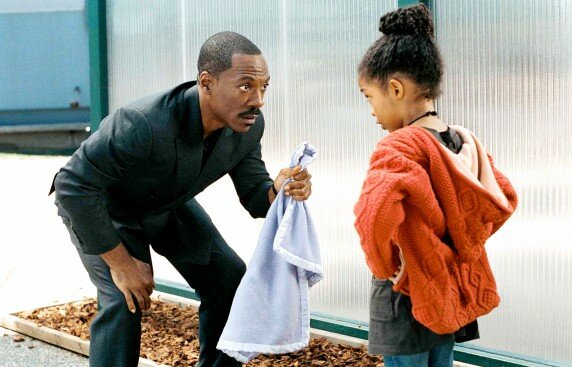One would have thought that after the monstrosities that were Norbit and Meet Dave, the only way was up for Eddie Murphy. Yet the once gifted comedian continues to treat his career like it were a game of limbo, as Imagine That sees Murphy stoop to a horrendous new low. To put bluntly, it’s cinematic torture; Murphy’s every attempt at inducing laughter repeatedly falls flat like a line of dominoes, leaving it up to his 9 year old co-star Yara Shahidi to pick up the pieces. Yet even she hasn’t enough charm to salvage what is quite possibly one of 2009′s biggest disasters.
To be fair, Murphy isn’t the only one to blame. The film was doomed from the beginning with Chris Matheson and Ed Solomon’s screenplay, which literally sees Murphy, as workaholic financial advisor Evan Danielson, put a blanket over his head and run around his house like an absolute moron for most of the film. The blanket belongs to his daughter Olivia (Yara Shahidi), which she takes everywhere as a form of security after the divorce of her parents. When his ex-wife Tricia (Nicole Ari Parker) tells him to take on a more active role in Olivia’s life, Evan finds the perfect reason to bond with his daughter when he discovers that her imaginary friends, connected with the blanket, turn out to be incredibly good financial advisors. They help Evan get the upper hand over his obnoxious colleague Johnny Whitefeather (Thomas Hayden Church) — who speaks Native American gobbledygook to woo his clients – in their rivalry for a big promotion.
![imagine_that15[1] imagine that151 225x350 Imagine That (Review)](/wp-content/uploads/imagine_that151-225x350.jpg)
|
The story derived from a conversation co-writer Ed Solomon had with his son, and in a perfect world, it would have stayed as just that. The sheer absurdity and meekness of the premise should be obvious enough, but my grievances with the film’s narrative don’t end there. Firstly, there’s the problem that Murphy’s character isn’t the least bit likeable. Why should we care for this self-absorbed father, who abuses his daughter’s insecurities for financial gain? While Evan inevitably has his moment of redemption – arriving at the last minute to his daughter’s recital – you’ll end up despising him all the more for making one of the most clichéd, gag-reflexive entrances in cinematic history.
Secondly, who in their right mind revolves a kids film around an investment banker? Half of the film takes place inside Evan’s workplace and deals with concepts that will go straight over the heads of children, likely boring them to pieces. For adults, these scenes are marginally less painful to watch than the other half of the film, where Murphy resorts to his manic slapstick antics within his daughter’s imagination.
This brings us to Imagine That’s most detrimental flaw; despite a title that suggests otherwise, the film is severely lacking imagination. Neither Evan nor the audience get to see a single glimpse of Olivia’s imaginary world. The idea is that we let our own imagination fill in the blanks, which is probably an attempt to cut back on costs more than anything else. Unsurprisingly however, our mind stays firmly grounded in reality. The point of a film is to visualise a text so we don’t have to, immersing us within the creative mind of the filmmaker and not our own. Take Pixar’s Up as a prime example, or any of the Harry Potter films. Since Imagine That visualises nothing of Olivia’s wild imagination, we’re left to watch Murphy strike up manic conversations with walls for 110 agonising minutes. Can anyone honestly imagine that being funny?
 Follow the author Anders Wotzke on Twitter.
Follow the author Anders Wotzke on Twitter.















